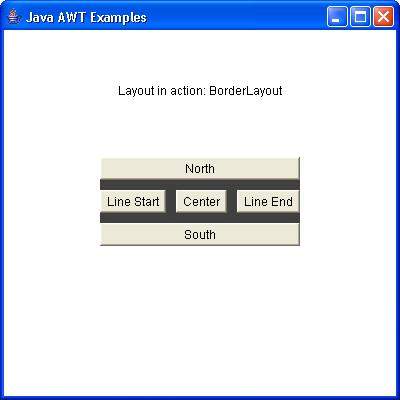
- AWT - Home
- AWT - Overview
- AWT - Environment
- AWT - Controls
- AWT - Event Handling
- AWT - Event Classes
- AWT - Event Listeners
- AWT - Event Adapters
- AWT - Layouts
- AWT - Containers
- AWT - Menu
- AWT - Graphics
AWT - Useful Resources
AWT BorderLayout Class
Introduction
The class BorderLayout arranges the components to fit in the five regions: east, west, north, south and center. Each region is can contain only one component and each component in each region is identified by the corresponding constant NORTH, SOUTH, EAST, WEST, and CENTER.
Class declaration
Following is the declaration for java.awt.BorderLayout class:
public class BorderLayout
extends Object
implements LayoutManager2, Serializable
Field
Following are the fields for java.awt.BorderLayout class:
static String AFTER_LAST_LINE -- Synonym for PAGE_END.
static String AFTER_LINE_ENDS -- Synonym for LINE_END.
static String BEFORE_FIRST_LINE -- Synonym for PAGE_START.
static String BEFORE_LINE_BEGINS -- Synonym for LINE_START.
static String CENTER -- The center layout constraint (middle of container).
static String EAST -- The east layout constraint (right side of container).
static String LINE_END -- The component goes at the end of the line direction for the layout.
static String LINE_START -- The component goes at the beginning of the line direction for the layout.
static String NORTH -- The north layout constraint (top of container).
static String PAGE_END -- The component comes after the last line of the layout's content.
static String PAGE_START -- The component comes before the first line of the layout's content.
static String SOUTH -- The south layout constraint (bottom of container).
static String WEST -- The west layout constraint (left side of container).
Class constructors
| S.N. | Constructor & Description |
|---|---|
| 1 | BorderLayout() Constructs a new border layout with no gaps between components. |
| 2 | BorderLayout(int hgap, int vgap) Constructs a border layout with the specified gaps between components. |
Class methods
| S.N. | Method & Description |
|---|---|
| 1 | void addLayoutComponent(Component comp, Object constraints) Adds the specified component to the layout, using the specified constraint object. |
| 2 | void addLayoutComponent(String name, Component comp) If the layout manager uses a per-component string, adds the component comp to the layout, associating it with the string specified by name. |
| 3 | int getHgap() Returns the horizontal gap between components. |
| 4 | float getLayoutAlignmentX(Container parent) Returns the alignment along the x axis. |
| 5 | float getLayoutAlignmentY(Container parent) Returns the alignment along the y axis. |
| 6 | int getVgap() Returns the vertical gap between components. |
| 7 | void invalidateLayout(Container target) Invalidates the layout, indicating that if the layout manager has cached information it should be discarded. |
| 8 | void layoutContainer(Container target) Lays out the container argument using this border layout. |
| 9 | Dimension maximumLayoutSize(Container target) Returns the maximum dimensions for this layout given the components in the specified target container. |
| 10 | Dimension minimumLayoutSize(Container target) Determines the minimum size of the target container using this layout manager. |
| 11 | Dimension preferredLayoutSize(Container target) Determines the preferred size of the target container using this layout manager, based on the components in the container. |
| 12 | void removeLayoutComponent(Component comp) Removes the specified component from this border layout. |
| 13 | void setHgap(int hgap) Sets the horizontal gap between components. |
| 14 | void setVgap(int vgap) Sets the vertical gap between components. |
| 15 | String toString() Returns a string representation of the state of this border layout. |
Methods inherited
This class inherits methods from the following classes:
java.lang.Object
BorderLayout Example
Create the following java program using any editor of your choice in say D:/ > AWT > com > tutorialspoint > gui >
AwtLayoutDemo.java
package com.tutorialspoint.gui;
import java.awt.*;
import java.awt.event.*;
public class AwtLayoutDemo {
private Frame mainFrame;
private Label headerLabel;
private Label statusLabel;
private Panel controlPanel;
private Label msglabel;
public AwtLayoutDemo(){
prepareGUI();
}
public static void main(String[] args){
AwtLayoutDemo awtLayoutDemo = new AwtLayoutDemo();
awtLayoutDemo.showBorderLayoutDemo();
}
private void prepareGUI(){
mainFrame = new Frame("Java AWT Examples");
mainFrame.setSize(400,400);
mainFrame.setLayout(new GridLayout(3, 1));
mainFrame.addWindowListener(new WindowAdapter() {
public void windowClosing(WindowEvent windowEvent){
System.exit(0);
}
});
headerLabel = new Label();
headerLabel.setAlignment(Label.CENTER);
statusLabel = new Label();
statusLabel.setAlignment(Label.CENTER);
statusLabel.setSize(350,100);
msglabel = new Label();
msglabel.setAlignment(Label.CENTER);
msglabel.setText("Welcome to TutorialsPoint AWT Tutorial.");
controlPanel = new Panel();
controlPanel.setLayout(new FlowLayout());
mainFrame.add(headerLabel);
mainFrame.add(controlPanel);
mainFrame.add(statusLabel);
mainFrame.setVisible(true);
}
private void showBorderLayoutDemo(){
headerLabel.setText("Layout in action: BorderLayout");
Panel panel = new Panel();
panel.setBackground(Color.darkGray);
panel.setSize(300,300);
BorderLayout layout = new BorderLayout();
layout.setHgap(10);
layout.setVgap(10);
panel.setLayout(layout);
panel.add(new Button("Center"),BorderLayout.CENTER);
panel.add(new Button("Line Start"),BorderLayout.LINE_START);
panel.add(new Button("Line End"),BorderLayout.LINE_END);
panel.add(new Button("East"),BorderLayout.EAST);
panel.add(new Button("West"),BorderLayout.WEST);
panel.add(new Button("North"),BorderLayout.NORTH);
panel.add(new Button("South"),BorderLayout.SOUTH);
controlPanel.add(panel);
mainFrame.setVisible(true);
}
}
Compile the program using command prompt. Go to D:/ > AWT and type the following command.
D:\AWT>javac com\tutorialspoint\gui\AwtlayoutDemo.java
If no error comes that means compilation is successful. Run the program using following command.
D:\AWT>java com.tutorialspoint.gui.AwtlayoutDemo
Verify the following output
